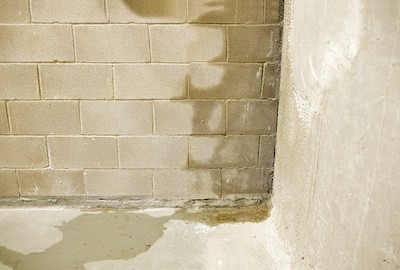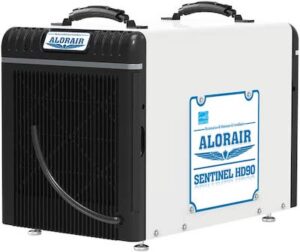Using a Dehumidifier in a Basement
As someone who has lived in the southern part of the United States for over twenty years, I have experience with intense humidity, and thus, dehumidifiers. Dehumidifiers, easily confused with their cousin, the humidifier, function as you might expect from the name. Unlike a humidifier which adds moisture to a dry room, dehumidifiers rhythmically suck moisture from the air so that you’re left with less humidity hanging around.
So, do you need a dehumidifier in a finished basement? Dehumidifiers work best in areas that typically have extra moisture in the air. Often, if you live in a hotter location that has a sticky feeling in the air, you may do well getting a dehumidifier. A basement would benefit from a dehumidifier.
You’ll find many homes with basements tucked away used for all sorts of things. From man caves to extra living spaces, a basement is a handy space to have for families. However, basements sometimes come with issues as well. Occasionally, a basement will have some challenges staying cool or hot due to its separation from the rest of the house.
A dehumidifier can be helpful for basements since some of this heating and cooling issue could stem from the built-up humidity in the basement. If you have a basement and you’re not quite sure if you need a dehumidifier yet, or what kind, keep reading! We have some handy tips on choosing the right dehumidifier for your finished basement.
Why Your Basement Probably Needs a Dehumidifier
Many areas of your home may suffer from excessive humidity. However, it’s often a problem that influences basements more than the other, higher areas of your home. Many people need to use a dehumidifier in their crawl space for this same reason. Your basement could be oddly damp for several reasons. It’s most likely that either your home is very humid or that there is a water leak somewhere in the foundation of your home. It is important to address these issues immediately. Having extra moisture anywhere in your home, including basements, might cause all sorts of issues for your home and your family.
Dehumidifiers Reduce Possibility of Mold & Mildew
If your basement feels damp and sticky when you step into it, chances are you need to invest in a dehumidifier. Using a dehumidifier for your basement will bring the humidity levels down significantly. This reduction of overall humidity in your basement will ensure that the chances of developing mold are less likely, mainly if the problem is stemming from moisture alone.
Stopping mold and mildew from contaminating your home is essential since these issues can become health issues for you and your family. If the climate of the area you live in tends to be sticky and humid, or overly wet during various seasons, or even year-round, you should most likely get a dehumidifier to decrease the chance of mold.
Mold and mildew love damp wood and surfaces, and you don’t want your home to be a pleasant home for them. Drafty windows and doors that tend to let in the elements could also make humidity a problem for your home. If your windows tend to get condensation gathered on them, even when it’s not raining, your home probably has a humidity problem.
A poorly insulated home could also lead to higher levels of humidity inside and eventually mold and mildew. If you’re building a house, it’s essential to ensure your home is adequately insulated, especially if you live in a humid area. If you own your home and it’s poorly insulated, you’ll want to try and update the insulation when you can. In the meantime, a dehumidifier and updating your windows and doors could help. Other ways you can help the humidity is by adding ventilation, fans, and more.
Sings You May Need a Dehumidifier
Maybe your home seems a little humid, but the signs aren’t as apparent as what we’ve discussed so far. Sometimes, poor insulation and high humidity are harder to find. Here are some signs that you might be missing in your home that mean you might need a dehumidifier:
- Condensation on windows and other surfaces
- Walls that are damp to the touch.
- Signs of mold in the home and basement.
- A moldy or mildewy smell that’s wafting through the house.
- Basement with a musty smell, as well.
- Watermarks on the floor (indicating a possible problem with the foundation)

If your home is experiencing one, or all of these, we would recommend getting a dehumidifier. These damp spaces will benefit from the dryer air and decreased mustiness. This will not only help your home in being a comfortable space to live in, but it will also benefit your overall health.
What Kind Of Dehumidifier is Best for a Finished Basement?
You’ve decided you must have a dehumidifier for your basement. You’re fed up with the musty odor and the way condensation gathers. However, you’ll find that as soon as you buy a dehumidifier, there are many options on the market. Basements often need a different dehumidifier system than you might typically buy for a standard room.
There are specific dehumidifiers for basements, with requirements for setup to ensure it works properly in a room with the tendency to be damper than the rest of a home. Dehumidifiers come in various shapes and sizes, from portable to massive, whole-house systems that work in conjunction with your home’s HVAC system.
If your entire home struggles with intense humidity (and you’ve already gotten a professional to ensure it’s not due to a foundation crack, etc.), you might consider one of these large, automatic dehumidifiers. You’ll be able to set the machine to your ideal humidity level, and the dehumidifier will automatically turn on to ensure it stays at that level.
Large home humidifiers will only work when your home is above 65 degrees. This means you’ll need to be intentional about the temperature of your basement, which often ends up being cooler than other rooms in your house. If you need a dehumidifier only in your basement, then forgo the whole house system, or plan on getting one for the basement and one for the rest of the house. It might be an investment, but it’s worth it to your health and your home.
Basement Dehumidifiers
Since basements are typically cooler than other parts of a home, you should consider investing in a dehumidifier specializing in temperatures below 65 degrees. Basements are notoriously cool since warm air usually rises, leaving the basement as the coolest area in your home. Investing in one of these specialized dehumidifiers will help ensure that your basement gets the benefits it needs to keep it dry and mold-free.
Portable Dehumidifier vs. Non-Portable Dehumidifier
Another popular dehumidifier option you might consider is a portable dehumidifier. Portable dehumidifiers are handy since you can take them to different rooms, etc. However, they can be harder to use since you have to remember always to empty the water tank that’s being continually filled at the dehumidifier is running. You can avoid that by getting a dehumidifier with a drain feature, which allows the water to empty via a drain automatically.
You can use a portable dehumidifier in basements, as well! As we mentioned above, we would recommend getting a portable dehumidifier meant to work in cooler temperatures. You can get a portable dehumidifier anywhere from 100 to 1,000 dollars. Maintenance will be vital no matter what.
Make sure you read up on your portable dehumidifier and follow the directions diligently. It’s essential to follow instructions such as how to clean, replacing filters, and more. A dehumidifier’s main job is to take extra water from the air. Because of this, it’s essential to keep it clean. Water can be a breeding ground for mold and more, so make sure you keep your dehumidifier clean at all times.
Portable dehumidifiers provide a simple and usually inexpensive solution to a sticky situation in your home. They are an excellent option for starting with a dehumidifier or just using one for your finished basement. A portable dehumidifier will help suck extra moisture from the air and make your basement a less inviting place for mold, mildew, and pests.
Reduce Your Basement’s Humidity
Hopefully, a dehumidifier will significantly aid in your basement’s humidity levels, helping dry out the air to a comfortable and healthy level. However, sometimes you might need to take additional steps besides a dehumidifier in the battle to lower humidity levels. As we talked about before, if you have a water leak or a problem with the foundation, then it might be causing excessive humidity in your home and basement.
If this is the case, then we recommend calling a Broken Arrow construction professional to look over your home for these issues. We also recommend cleaning your gutters, avoiding over-watering around the landscape of your home, and ensuring that your clothes dryer has proper ventilation. Of course, we also recommend prioritizing overall ventilation in your home, from fans to vents throughout your home. Getting a professional to look over the issue is vital to the health of your home. However, there are also simple steps you can take, like getting a portable dehumidifier.
We hope this helps you with any sticky situations in your home! You can find more home tips from experts here.

